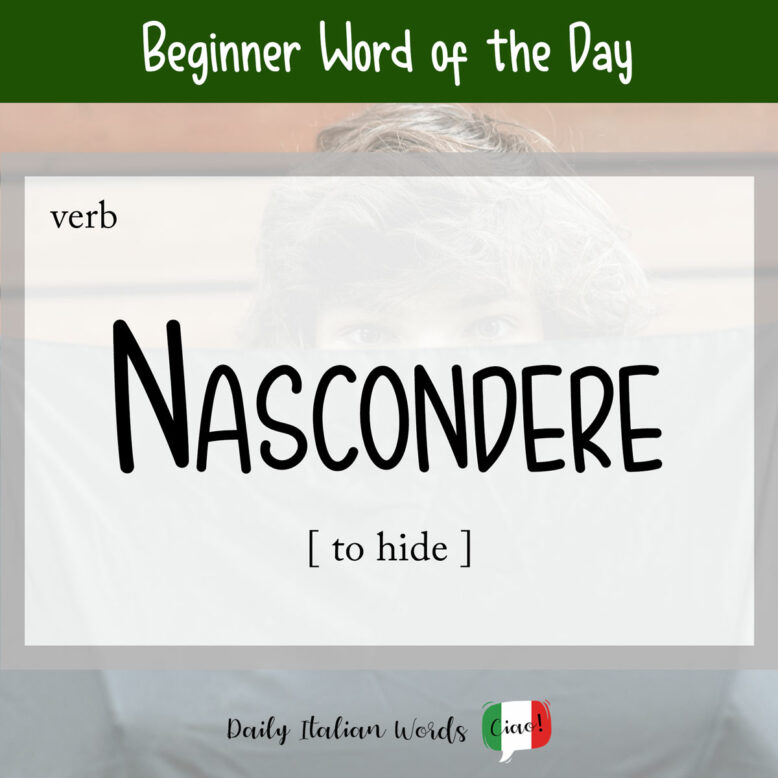Whenever my mom and I take my son to school, he enjoys playing hide-and-seek behind the walls and buildings that line the streets, adding a bit of excitement to our daily stroll! His penchant for this game inspired me to write about the word nascondere, which translates to to hide.
nascondere
to hide

The word originates from the Late Latin (i)nabscondĕre, composed of the prefix in- and abscondĕre, through aphaeresis (the omission of the initial sound of a word).
Nascondere is an -ERE verb which is conjugated in the present tense in the following manner:
io nascondo = I hide
tu nascondi = you hide (informal)
lui nasconde = he hides
lei nasconde = she hides
Lei nasconde = you hide (formal)
noi nascondiamo = we hide
voi nascondete = you hide (plural)
loro nascondono = they hide
Nascondere is a transitive verb, which means it must always take a direct object. For example, in the phrase Elia nasconde l’uovo di cioccolato (Elia hides the Easter egg), the egg is the object.
Io nasconderò il giocattolo e tu lo dovrai cercare.
I’ll hide the toy and you’ll have to find it.
But what if you want to describe the act of hiding from someone or something? In this case, you need to use the reflexive verb nascondersi (literally “to hide oneself”).
Mio figlio si nasconde sempre dietro la siepe.
My son always hides behind the bush.
(Literally “My son always hides himself behind the bush”)
Il gatto si è nascosto nella scatola.
The cat is hiding inside the box.
(literally “The cat has hidden itself inside the box”)

Figuratively, nascondersi can also refer to something, such as a fact, feeling or story, that is hiding or hidden behind something else, such as a facade or false emotion.
Dietro il suo sorriso si nasconde tanto dolore.
Much pain is hidden behind his smile.
Coming back to hide-and-seek, this game is called nascondino in Italian, which is the combination of nascondere and the diminutive suffix -ino. Two synonyms for nascondino are nasconderella and nasconderello, both of which are primarily used in Rome. In order to win this game, you need to find a good nascondiglio (hiding place).
A nasconditore is a hider or concealer while the noun nascondimento refers to the act of hiding or concealing something. Keep in mind that these two words are mostly used in literary Italian.
Idiomatic expressions containing ‘nascondere’
Lanciare / Tirare il sasso e nascondere la mano
Literal translation: to throw the stone and hide the hand
English meaning: to intentionally do something that damages or offends someone else, only to deny involvement once exposed
Nascondere la testa sotto la sabbia
Literal translation: to hide one’s head under the sand
English meaning: to bury one’s head in the sand
Heather Broster is a graduate with honours in linguistics from the University of Western Ontario. She is an aspiring polyglot, proficient in English and Italian, as well as Japanese, Welsh, and French to varying degrees of fluency. Originally from Toronto, Heather has resided in various countries, notably Italy for a period of six years. Her primary focus lies in the fields of language acquisition, education, and bilingual instruction.


